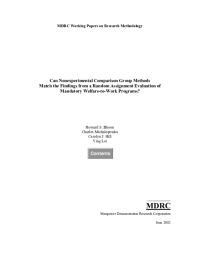Can Nonexperimental Comparison Group Methods Match the Findings from a Random Assignment Evaluation of Mandatory Welfare-to-Work Programs?
Using an unusually rich set of individuals’ earnings data, employment histories, and socio-economic characteristics, the authors address two questions: (1) Which nonexperimental comparison group methods provide the most accurate estimates of the impacts of mandatory welfare to work programs; and (2) do the best methods work well enough to substitute for random assignment experiments? The nonexperimental groups are compared with experimental control groups from a large-sample, six-state random assignment experiment — the National Evaluation of Welfare-to-Work Strategies. The methods examined combine different types of comparison groups, with different propensity score balancing approaches and different statistical models. This document is part of MDRC's methodology working paper series.







